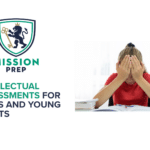Psychological Testing: What It Is & How It Supports Diagnosis

It’s difficult to fathom that teens in high school may already be so negatively impacted by life that they struggle with mental health conditions, and yet the statistics show this. In a 2023 survey carried out by the Centers for Disease Control and Prevention (CDC), they found that 40% of high school students indicated that they persistently feel sad and hopeless.¹
This doesn’t just mean that a high percentage of teens are experiencing moody behavior. It points to something deeper. Adolescents need convenient access to support for their emotional and psychological development – that much is evident.
While counseling and therapy offer essential support, there are moments when families need more than that. They need to understand the underlying causes and how they can support each other to manage or overcome mental health concerns. For this, psychological testing plays a critical role. Psychological screening for teens goes deeper, helping uncover how a teen interprets the world, solves problems, and handles emotions – sometimes beyond what a conversation can reveal.
At Mission Prep, psychological testing isn’t about checking boxes or labeling kids. We focus on understanding their experience from the inside out. The assessments we offer reveal patterns in thinking, learning, and emotional behavior, so we can figure out what kind of support will actually make a difference.

What Is Psychological Testing for Adolescents?
Psychological testing for teens includes a wide range of evaluations designed to understand cognitive, emotional, and behavioral health. These tools aren’t at all about slapping a label on, but instead focus on understanding what a teen needs to thrive. Youth cognitive and emotional testing is done with empathy – every time.
At Mission Prep, our team uses mental health and diagnosis assessments to fully explore a person’s life experience, from emotional regulation to cognitive patterns and learning styles. Each adolescent mental health testing process is personalized to match the specific questions and concerns that have come up for the teen and their family, while also maintaining ethical and clinical standards.
The Individuals with Disabilities Education Act (IDEA) generally ensures that psychological testing in school settings is done appropriately.² When it comes to clinical settings like Mission Prep, best practices and the code of ethics established by the American Psychological Association (APA) must be observed.³ This ensures that strict ethical standards are adhered to, such as confidentiality, age-appropriate methods, and cultural sensitivity.
These assessments are backed by legal and clinical frameworks that prioritize accuracy, fairness, and the best interests of the young person being evaluated.
Why Would a Child Need a Psychological Assessment?
Behavioral or emotional changes that don’t have a clear explanation often prompt the need for a teen psychological exam. A teen who once excelled in school might suddenly fall behind. Someone outgoing may begin to withdraw. When shifts like these last for more than a few weeks, a deeper look is worth considering.
Mental performance testing for youth or academic testing for adolescents is recommended if you notice the following signs:
- Academic decline or skipping school
- Frequent outbursts or emotional withdrawal
- Trouble focusing, remembering, or completing tasks
- Difficulty managing anxiety, sadness, or irritability
- Risk-taking or impulsive behavior
Key Areas Assessed Through Psychological Testing
Testing can uncover what a teen’s needs are. Common areas that are assessed include:
- Cognitive ability: Cognitive-behavioral testing adolescents with tests like the WISC-V helps evaluate memory, verbal comprehension, and processing speed.
- Emotional health: Tools such as the Beck Youth Inventories assess mood disorders and emotional struggles.
- Behavioral tendencies: Screeners like the BASC-3 provide insight into how a teen manages stress, social interactions, and self-control.
- Academic strengths and challenges: Testing for learning disabilities in teens helps clarify whether learning differences or disabilities may be affecting performance.
- Neuropsychological function: When symptoms suggest brain-based challenges – like after a concussion – youth neuropsychological testing can help guide care.
The combined results paint a clear picture of a teen’s strengths, struggles, and support needs.
What’s the Psychological Testing Process?
At Mission Prep, psychological testing starts with a conversation – not paperwork. Our team begins by getting to know the teen and their caregivers, taking time to understand what’s been going on emotionally, academically, or behaviorally. This initial intake helps shape the testing strategy. No two teens are the same, so no two evaluations should be, either.
Once we’ve established the right direction, we move into structured assessments that explore four key areas:
Interviews With Caregivers and the Teen
Interviews are handled like conversations where the teen is free to talk openly and made to feel entirely comfortable. The conversations are designed to provide deeper insight into the teen’s daily life. Topics will cover a wide range of things such as school challenges, relationships, and mood regulation.
While parents can provide a timeline and mention concerns, the teen can provide their perspective on how things feel for them. Each interview gives more detail on what’s going on, often bringing to light more information that would generally be written on a form.
Behavior Checklists and Rating Scales
Standardized tools like the BASC-3 or Conners Rating Scales allow us to quantify patterns in attention, emotion, and behavior. These forms are typically filled out by the teen, caregivers, and sometimes teachers, offering multiple viewpoints. Research emphasizes the importance of using multi-informant data to significantly increase diagnostic accuracy over single-source reporting.⁵
Academic and Intellectual Testing
We assess learning styles, cognitive strengths, and potential challenges with tasks that measure memory, processing speed, problem-solving, and comprehension. This can clarify whether academic issues stem from something like ADHD, a learning disability, or emotional distraction.
Emotional and Personality Assessments
Emotional IQ testing and personality assessments for youths helps identify patterns in mood, self-esteem, and how teens interpret the world around them. They can uncover internal struggles – like anxiety or depression – that may not be visible on the surface. When interpreted alongside interviews and behavioral data, they form a clearer psychological profile that informs the next steps.
Throughout this process, the teen isn’t “tested” in a high-stakes way. We aim for a supportive, low-pressure environment that encourages openness and honesty. Once all the data is gathered, our team compiles the findings into a personalized report. We then meet with the family to walk through the results and recommend a care plan based on their teen’s specific needs and goals.
Once testing is complete, we review the results with families and create a clear, personalized care plan.
How to Prepare Your Teen for Psychological Processing
Teens are more likely to engage in the process if they know what to expect, and why it matters.
Start with reassurance before the teenage behavior testing:
- “There’s no judgment in this process. This is to help us understand how to support you in the best way.”
- “The person you’ll talk to is trained to help teens. This is a safe space to be yourself.”
Some tips to help things go smoothly on the day of the teenage mental function evaluation:
- Get a full night’s sleep before the appointment
- Eat breakfast and bring a snack
- Wear comfortable clothes
- Pack water and anything comforting (like a fidget or book)
The best way to get a teen interested in follow-up treatments is by making them feel supported every step of the way, starting with caregivers. Calm, steady, and supportive caregiver involvement reduces teen anxiety and improves cooperation during assessments.
Finding the Right Psychological Testing Center
Not all mental health providers are equipped to meet the unique needs of teenagers and provide an accurate psychological profile for teenagers. Adolescents aren’t just “small adults” – they experience and express mental health challenges differently, and that’s why choosing the right testing center matters.
Look for a teen mental health provider that truly specializes in youth. That means clinicians who have experience with adolescent development, an understanding of how symptoms present during different life stages, and the ability to build rapport with teens who may be hesitant or unsure about the process. A good testing center won’t just assess symptoms; they’ll know how to make your teen feel seen, safe, and heard.
You should also expect the use of gold-standard, research-backed assessment tools. These tools are designed to measure emotional regulation, cognitive ability, behavioral patterns, and academic functioning in ways that are developmentally appropriate. Be cautious of any center that relies solely on interviews or informal checklists.
Clear communication is another key factor. Parents and teens should walk away understanding not only the results of the evaluation but what comes next – and why. That includes a written report in plain language and a thoughtful plan for follow-up.
At Mission Prep, psychological testing is part of a broader, holistic effort to support young people and their families. We take the time to look at the full picture—emotional, academic, cognitive, and behavioral – so you get more than a diagnosis. You get a map. Whether your child is facing challenges in school, struggling with anxiety or low mood, or simply not feeling like themselves, our goal is to provide answers that lead to healing.
We don’t just test for the sake of testing. We test to help teens thrive.

Get Started With Psychological Testing With Mission Prep
Psychological testing not only names a potential problem, but opens the door to real treatment and support. For teens facing virtually invisible struggles, an accurate picture of what’s going on can be what they need to turn things around.
At Mission Prep, we make that picture clearer. From the first intake to the final recommendations, we’re here to guide you with care, evidence-based tools, and a genuine understanding of adolescent mental health.
We offer a range of teen support services, from intensive inpatient support across multiple treatment centers to virtual outpatient therapy. So, whatever your or your teen’s situation, we’ve got you covered.
Reach out to us at (866) 522 0931 to get the support you need, straight away.
References
- Centers for Disease Control and Prevention. (2024, August 6). Youth Risk Behavior Survey data summary & trends report: 2013–2023. U.S. Department of Health and Human Services. https://www.cdc.gov/yrbs/dstr/pdf/YRBS-2023-Data-Summary-Trend-Report.pdf
- Individuals with Disabilities Education Act, 20 U.S.C. § 1400 (2004). https://sites.ed.gov/idea/
- American Psychological Association. (2013). Guidelines for psychological assessment and evaluation. https://www.apa.org/about/policy/guidelines-psychological-assessment-evaluation.pdf
- McGorry, P. D., & Mei, C. (2018). Early intervention in youth mental health: Progress and future directions. Evidence-Based Mental Health, 21(4), 182–184. https://doi.org/10.1136/ebmental-2018-300060
- De Los Reyes, A., Wang, M., Lerner, M. D., Makol, B. A., Fitzpatrick, O. M., & Weisz, J. R. (2022). The Operations Triad Model and youth mental health assessments: Catalyzing a paradigm shift in measurement validation. Journal of Clinical Child & Adolescent Psychology, 52(1), 19–54. https://doi.org/10.1080/15374416.2022.2111684
















